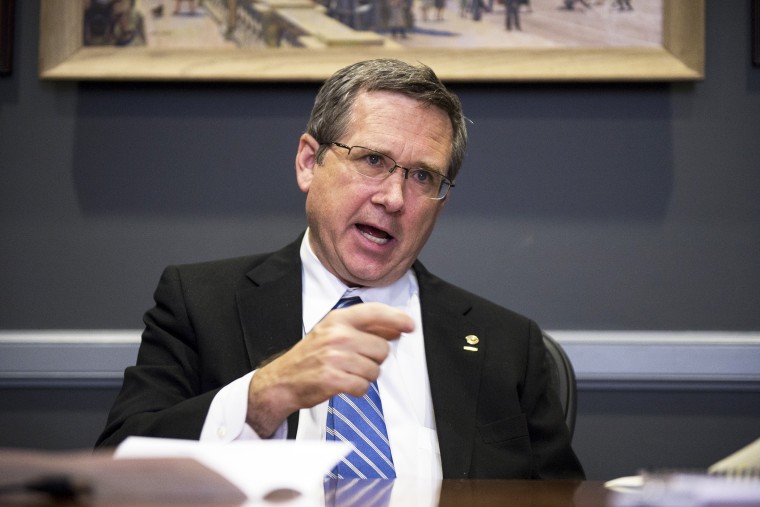Congressional Republicans' "Never Trump" contingent is modest, but it exists. There are a handful of GOP senators, governors, and representatives who've decided to buck their party and withhold their backing from Donald Trump -- and there's scant evidence, at least for now, that any of them will change their minds.
Yesterday, however, brought something new: a prominent Republican official who had extended his support to Trump announcing he's
now withdrawing that backing.
Sen. Mark Kirk, Republican of Illinois, released a statement Tuesday saying that Trump lacks "the temperament" necessary for the Oval Office. "After much consideration, I have concluded that Donald Trump has not demonstrated the temperament necessary to assume the greatest office in the world," Kirk said in a statement.
It's not a coincidence that Kirk, almost certainly Congress' most vulnerable Republican incumbent, is making a high-profile effort to distance himself from Trump while facing a tough re-election fight in a blue state.
Nevertheless, Kirk's written statement added, "As the Presidential campaign progressed, I was hoping the rhetoric would tone down and reflect a campaign that was inclusive, thoughtful and principled. While I oppose the Democratic nominee, Donald Trump's latest statements, in context with past attacks on Hispanics, women and the disabled like me, make it certain that I cannot and will not support my party's nominee for President regardless of the political impact on my candidacy or the Republican Party."
This is likely to help Kirk in a state like Illinois, though his reversal does raise some related questions, such as, "Why now?" How is it, exactly, that Kirk, up until yesterday, expected Donald Trump to run a campaign "that was inclusive, thoughtful and principled"?
Around the same time Kirk's statement was released, Senate Majority Leader Mitch McConnell (R-Ky.), in what appears to be his most forceful rebuke of his party's presidential candidate,
told reporters it's time for Trump "to quit attacking various people you competed with or various minority groups in the country and get on message,"
I hate to sound picky, but racial demagoguery and resentment is Donald Trump's message. Whether McConnell likes it or not, this is the message that made Trump the presumptive Republican nominee in the first place. Trump's recent remarks have been scandalous, but by any fair measure, he's never been more "on message."
The
Washington Post's Dana Milbank had
a good column on this yesterday.
The things Trump is doing now -- disparaging the "Mexican" judge, disqualifying Muslim judges, calling somebody claiming Native American blood "Pocahontas" and singling out "my African American" -- is very much in line with what he has been doing for the past year, and before. More than six months ago, I began a column by proposing, "Let's not mince words: Donald Trump is a bigot and a racist." His bigotry went back decades, to the Central Park jogger case, and came to include: his leadership of the "birther" movement suggesting President Obama was a foreign-born Muslim, his vulgar expressions for women, his talk of Mexico sending rapists into America, his call for mass deportation, his spats with Latino news outlets, his mocking Asian accent, his tacit acceptance of the claim that Muslims are a "problem" in America, his agreement that American Muslims should be forced to register themselves, his call to ban Muslim immigration, his false claim about American Muslims celebrating 9/11, his tweeting of statistics from white supremacists, his condoning of violence against black demonstrators and his mocking of a journalist with a physical disability.
And really, that's not a comprehensive list.
Mark Kirk and Mitch McConnell heard all of these comments and not only bit their tongue, but also said Donald Trump should be the leader of the free world. This week, however, Kirk changed his mind, and McConnell implored Trump to get "on message" -- as if the senators were somehow surprised by the candidate's recent outbursts.
One might argue that there's a cumulative effect, and Trump's race-based criticisms of a federal judge were the proverbial straw that broke the camel's back. But this nevertheless suggests Kirk and others in the GOP believe everything they'd seen and heard from Trump up until last week was both acceptable and tolerable in a presidential candidate.
And that is a posture that's awfully tough to defend.
